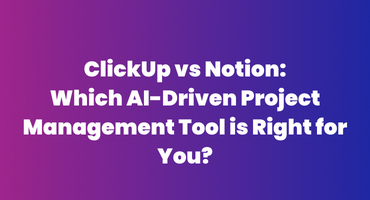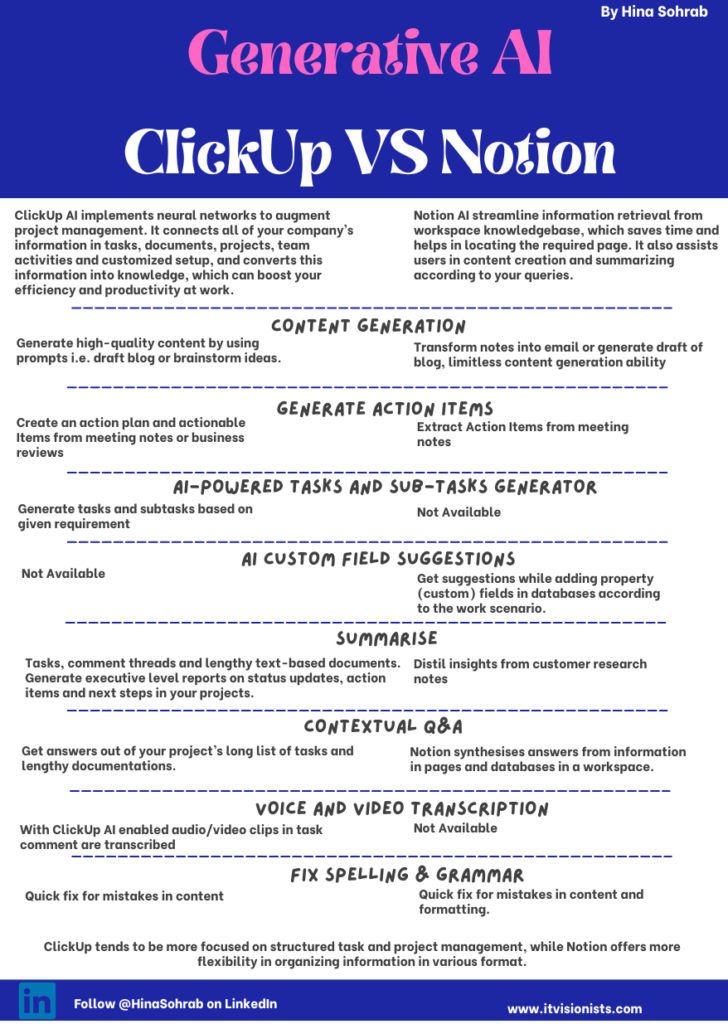
Choosing the right project management tool is essential to enhancing your team’s productivity, keeping projects on track, and ensuring smooth collaboration. ClickUp and Notion are two of the most popular tools available today, but how do they compare? In this detailed guide, we’ll help you understand which platform is the best fit for your needs by diving into their features, pricing, usability, and more.
What is ClickUp?
ClickUp is a versatile productivity platform designed for teams of all sizes. It provides task management, time tracking, document sharing, and goal setting—all in one place. With its robust features, ClickUp is designed for teams that need flexibility and a high level of customization in their workflows.
Key Features:
- Task Management
- Gantt Charts
- Time Tracking & Reporting
- Document Collaboration
- Automations and Integrations
ClickUp’s strength lies in its flexibility—ideal for teams needing detailed project tracking and workflows. If you need help implementing ClickUp to suit your specific needs, consider exploring a ClickUp consultant service to tailor the platform to your team’s goals.
What is Notion?
Notion is an all-in-one workspace for notes, knowledge management, and collaboration. Unlike ClickUp, which focuses on task and project management, Notion excels as a versatile tool for organizing documents, brainstorming ideas, and building knowledge bases. Its minimalistic interface and customization options make it appealing for individuals and smaller teams.
Key Features:
- Knowledge Management
- Databases & Tables
- Note-taking & Document Editing
- Customizable Templates
- Collaboration & Sharing
Notion is the best fit for teams that prioritize simplicity and note-based collaboration while still needing some project management functionality.
ClickUp vs Notion: Key Feature Comparison
| Feature | ClickUp | Notion |
|---|---|---|
| Task Management | Advanced task management with Gantt charts, to-do lists, and timelines. | Basic task management using Kanban boards or lists. |
| Customization | Highly customizable with task templates, automations, and workflows. | Offers customization mainly in terms of databases and templates. |
| Collaboration | Strong team collaboration with real-time comments, task assignments, and integrations. | Ideal for team collaboration on documents and knowledge bases. |
| Integrations | Extensive integrations with Google Drive, Slack, and more. | Integrates with tools like Google Drive, but fewer than ClickUp. |
| Pricing | Free plan with limitations, paid plans starting from $5/user/month. | Free plan with all features, paid plans start from $4/user/month. |

Task Management: Which is Better?
ClickUp stands out for its robust task management capabilities. With features like task dependencies, subtasks, recurring tasks, and time tracking, it’s perfect for teams that need to manage multiple complex projects. Additionally, ClickUp’s Gantt charts and calendar views make it easier to visualize project timelines.
Notion, on the other hand, offers basic task management features with Kanban boards and simple lists. While it’s sufficient for smaller teams or individual use, it doesn’t provide the same level of task management depth as ClickUp.
Customization: Which Tool is More Flexible?
When it comes to customization, ClickUp leads with its ability to tailor workflows, templates, views, and automations to meet specific team needs. You can create custom fields, automate repetitive tasks, and design your dashboards for maximum productivity.
Notion is highly customizable in terms of templates and document layouts. Its database features allow for some flexibility, but it lacks the same depth in task-related customization. If you need a flexible, task-oriented platform, ClickUp is the better choice.
Pricing: Which Tool Offers Better Value?
ClickUp offers a free plan, which is excellent for smaller teams or individuals. However, to unlock its full potential, including advanced features like reporting, timelines, and integrations, you’ll need to opt for one of its paid plans, which start at $5 per user per month.
Notion offers a free version with most of its features unlocked, including unlimited blocks and pages, which makes it an attractive option for individuals or smaller teams. Paid plans start at $4 per user per month and provide additional features such as advanced permissions and admin tools.
Pros & Cons of ClickUp and Notion
ClickUp Pros:
- Advanced task management and project tracking
- Highly customizable workflows and dashboards
- Rich set of integrations and automation options
- Great for larger teams or complex projects
ClickUp Cons:
- Steeper learning curve
- Can feel overwhelming due to the wide array of features
Notion Pros:
- Simple, clean interface ideal for note-taking and knowledge management
- Great for small teams or personal use
- Free plan includes all essential features
Notion Cons:
- Limited task management and project tracking features
- Less suitable for large teams or complex projects
Which Tool is Right for You?
If you are looking for an all-in-one solution for task management, team collaboration, and advanced project tracking, ClickUp is the better choice. It’s ideal for teams that need flexibility and powerful features to manage complex workflows.
On the other hand, if you value a clean, user-friendly interface for organizing notes, managing simple tasks, and building a knowledge base, Notion will serve you better. It’s particularly useful for smaller teams or individuals who don’t require advanced task management features.
Final Thoughts
Both ClickUp and Notion offer unique strengths that make them valuable tools depending on your team’s needs. Whether you’re managing large projects or organizing your thoughts and documents, there’s a tool for every workflow. Test both platforms to see which one aligns best with your requirements.
